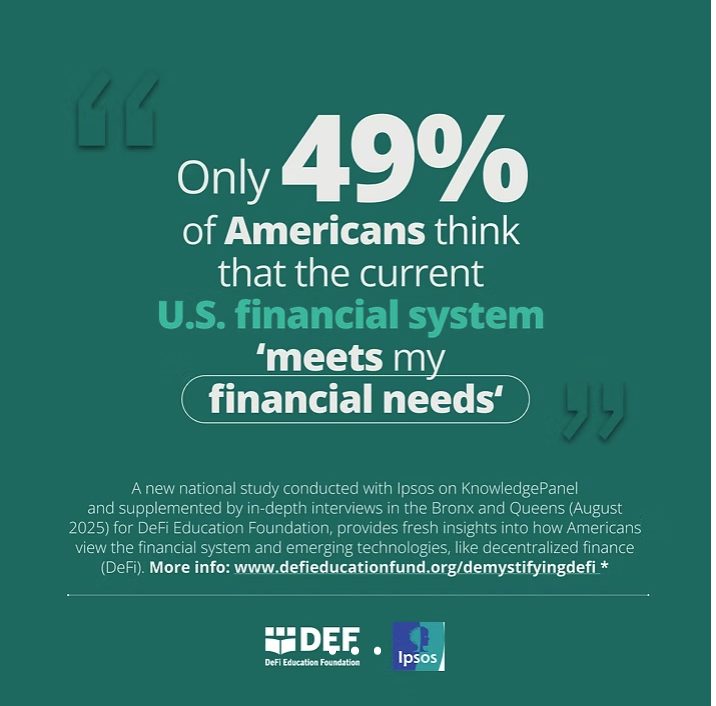Regulatory Clarity Could Drive 40% of Americans to Adopt DeFi Protocols, Survey Shows
Over 40% of Americans express willingness to use decentralized finance (DeFi) protocols once regulatory clarity on crypto privacy emerges, according to a recent survey from crypto advocacy organization the DeFi Education Fund (DEF).
The survey, released on September 18, revealed that many Americans feel frustrated with traditional financial institutions and seek greater control over their financial assets and data.
Respondents believe DeFi innovations can deliver this change by providing affordability, equity, and consumer protection.
The survey was conducted with Ipsos on KnowledgePanel and included supplementary in-depth interviews in the Bronx and Queens between August 18 and 21, polling 1,321 US adults.
Survey Results Show Americans Ready to Adopt DeFi Protocols
The findings demonstrate that many Americans are curious about DeFi despite its early stage.
42% of Americans indicated they would likely try DeFi if proposed legislation becomes law (9% extremely/very likely and 33% somewhat likely).
84% said they would use it to “make purchases online,” while 78% would use it to “pay bills.”
According to the survey, 77% would use DeFi protocols to “save money,” and 12% of Americans are “extremely” and “very” interested in learning about DeFi.
Moreover, nearly 4 in 10 Americans believe that DeFi can address high transaction and service fees found in traditional finance (39%).
Consistent with other probability-based sample surveys, the Ipsos x DEF research shows that almost 1 in 5 Americans (18%) have owned or used crypto at some point in their lifetime.
Nearly a quarter of Americans (22%) said they’re interested in learning more about nontraditional forms of finance, such as blockchain, crypto, or decentralized finance.
 Source: DEF
Source: DEF
The research shows that more than half (56%) of Americans want to reclaim control of their finances.
Americans are interested in having control over their money at all times, and many seek ways to send or receive money without intermediaries.
One Bronx, NY resident shared his experience of needing to transfer money between accounts, but the bank required him to certify the transfer and visit in person because he couldn’t move the amount he needed remotely.
He expressed frustration about the situation because “it was my money… I didn’t understand why I was given a hard time.“
More than half of surveyed Americans agree there should be a way to digitally send money to people without third-party involvement, and this number rises notably for foreign-born Americans (66%).
The researchers concluded that Americans are interested in DeFi and believe DeFi can reduce friction points in today’s financial system.
Regulatory Developments on DeFi Adoption in the U.S
Last month, DeFi Education Fund called on the US Senate Banking Committee to rethink how it plans to regulate the decentralized finance industry after reviewing its recently published discussion draft on a key crypto market-structure bill.
The response, signed on behalf of DeFi Education Fund (DEF) members including a16z Crypto, Uniswap Labs, and Paradigm, argued the Responsible Financial Innovation Act of 2025 (RFA) bill should be crafted in a more tech-neutral manner.
The group also emphasized that crypto developers should be protected from “inappropriate regulation meant for intermediaries,” and that self-custody rights for all Americans are “essential.”
The banking committee is now working on the discussion draft to help ensure it builds on the Digital Asset Market Clarity Act of 2025.
The goal is to promote innovation in the $162 billion DeFi industry without compromising consumer protections or financial stability.
On September 5, US Federal Reserve Governor Christopher Waller said there was “nothing to be afraid of” about crypto payments operating outside the traditional banking system.
This statement has raised hopes among many that DeFi would soon become the new financial infrastructure for Americans and the world.
คุณอาจชอบเช่นกัน

Kaisa Capital surged 250% after the company announced a strategic transformation and launched its RWA tokenization business.

How TRC20 Tokens Can Drive Growth for the Crypto Startup
